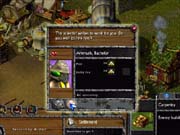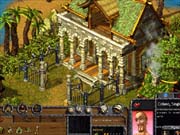Computer games are ultimately a form of escapism. It's certainly just as legitimate to sit at your computer and manage a simulated ant colony, kill an evil dragon, or fly an F-16. Apparently, some players also like to use their computers to build communities of tiny, imaginary people and watch over them as they perform various mundane tasks. This subgenre of strategy gaming, focusing on community building and resource gathering, has been defined by Blue Byte over the course of its long-running Settlers series. In 1994, Settlers was an engaging, original idea that combined elements of Civilization and SimCity. In 2001, the blueprint for games in this subgenre--games like The Nations--is still more or less exactly the same and just ends up looking like an idea that various companies have milked to death for the past seven years.

The Nations is firmly rooted in the tradition of Settlers series. You're presented with a rudimentary settlement, and you must direct its inhabitants to develop it by building schools and roads, by researching new technologies, and trading with neighbors. The game includes three races: amazons, pimmons, and sajikis, who have different priorities and lifestyles, and this adds a bit of variation (although most of the structures are identical). There is some combat, but for the most part, the languid pace of the game combines with the music to induce an almost hypnotic state that discourages combat. Another term for this state is "boredom."
Units in The Nations have a variety of needs and attributes, such as health, vitality, motivation, hygiene, and so forth, and these needs must be met and maintained or their performance will suffer. All the units are individuals with unique statistics (and names), and the result is a bit like a game of The Sims played on a SimCity map. This is very similar to the recent Cultures, which did the same thing with a Viking theme.
The Nations does a much better job than Cultures at creating a lively game atmosphere. JoWood has really exerted its creative skills in the game's visual design, as well as its inherent European expertise in producing engaging cartoons and trance-ambient background music, and the inclusion of three races and some interesting artwork succeeds in making the whole thing visually attractive. The problem is in the gameplay.
More specifically, the problem is that while Settlers-style gameplay was interesting a long time ago, it really hasn't changed in almost a decade. If that's still not a problem for you, you'll probably enjoy The Nations.

The Nations is essentially a Settlers game with the addition of individual unit personalities. And the problem with that is that it really amounts to absolutely no personality at all, because even though all the characters are named and do cute little animation things, it doesn't make a bit of difference. All the units do basically the same things, and apart from the unit portraits, they look and sound the same as well. This completely undermines the illusion of individuality of the citizens. In a similar attempt, Majesty: The Fantasy Kingdom Sim by Cyberlore Studios got this part completely right by distinguishing its citizens on the basis of character stats that can be improved through quick, straightforward tasks. You become attached to the characters because some of them can actually do things others can't, and protecting them so that they can perform other tasks keeps you interested. But in keeping with the Settlers tradition, The Nations is not very task based, which works fine in general but doesn't fit well with the attempt to include individual characters.
The game has some minor technical issues, the most annoying of which is that zooming the view out to display as much of the map as possible causes the game to slow down. This doesn't seem to be intentional, as the effect is jerky and erratic. For the most part, though, The Nations is a polished game that really looks like it has a lot to offer. And it actually may, depending on how many other games like it you've played over the years.
Fundamentally, The Nations takes the familiar Settlers community-management gameplay and manages to not screw it up in any meaningful way. If you're not crazy about these sorts of games, though, it'll only make you wonder why, after four iterations of the Settlers engine, plus numerous offshoots, we keep getting almost the same exact thing over and over.